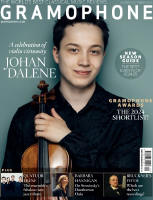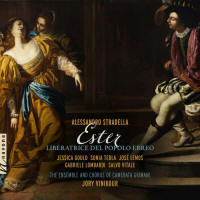Texte paru dans: / Appeared in:
|
|
|
|
|
|
Ester, liberatrice del popolo Ebreo was probably written in the early 1670s for one of Rome’s confraternities that sponsored Lenten oratorios. Its librettist has been identified as Lelio Orsini, Prince of Vicovaro and member of a powerful dynastic Roman family. The sole surviving manuscript musical source is a short score (only voice and basso continuo parts) preserved in Modena’s Biblioteca Estense; copied by an unknown scribe, it has no violin parts but there are cues for ritornellos segued in 21 numbers.
The only prior recording of Stradella’s oratorio did not reconstruct the missing violins and over-compensated by fielding an implausibly enormous continuo group and a beefy chamber choir that obscured polyphonic balance in madrigalian ensembles (most of the ‘choruses’ are actually chamber trios). An alternative, less clumsy account is overdue.
Camerata Grimani offer a convincing artistic improvement in several respects. Recorded in Padua, the compact band of mostly Italian instrumentalists has polished adeptness, directed by Jory Vinikour from the harpsichord and organ. The simple yet attentive continuo group is rounded off by harp, archlute and viola da gamba (the latter sometimes switching to violone). Moreover, two violinists play succinct ritornellos in most places where the Modenese manuscript calls for them. It is not explained who was responsible for these convincing reconstructions.
Ensembles are sung with effective interplay and verbal chiaroscuro by a small group of five Italian specialists, most of whom also take various solo roles. On the whole, the singers are persuasive in terms of technical quality and delivery of text, even if several potentially dramatic crunch points are underbaked or perfunctory. Gabriele Lombardi’s fluency with rhythms and text suits the superficial charisma and pomposity of the genocidal Haman; his response to the Hebrews’ chamber trio lamentation at the start of Part 2 fails to capture the villain’s mocking sarcasm and menace. Salvo Vitale is calmly authoritative as the Persian king Assuerus. The figure of Celestial Hope is sung articulately by Sonia Tedla. American soprano Jessica Gould is the creative force driving this project and takes the title-role, although her over?stretched singing is unsubtle, unsteady and unreliable.
Digital-only label Navona’s raison d’être is to release Dolby Atmos product. To sidestep unreasonable technological exclusivity, ordinary MP3 downloads are available. Either way, Navona forsakes a properly cohesive booklet in favour of a sprawling webpage that requires listeners to juggle multiple browser tabs inconveniently. A long, tangential and unreliable programme note has nothing much to say about Stradella’s music. Still, the eye-catching digital cover design makes suitably on-topic use of Artemisia Gentileschi’s Esther before Ahasuerus (c1630). |
|




